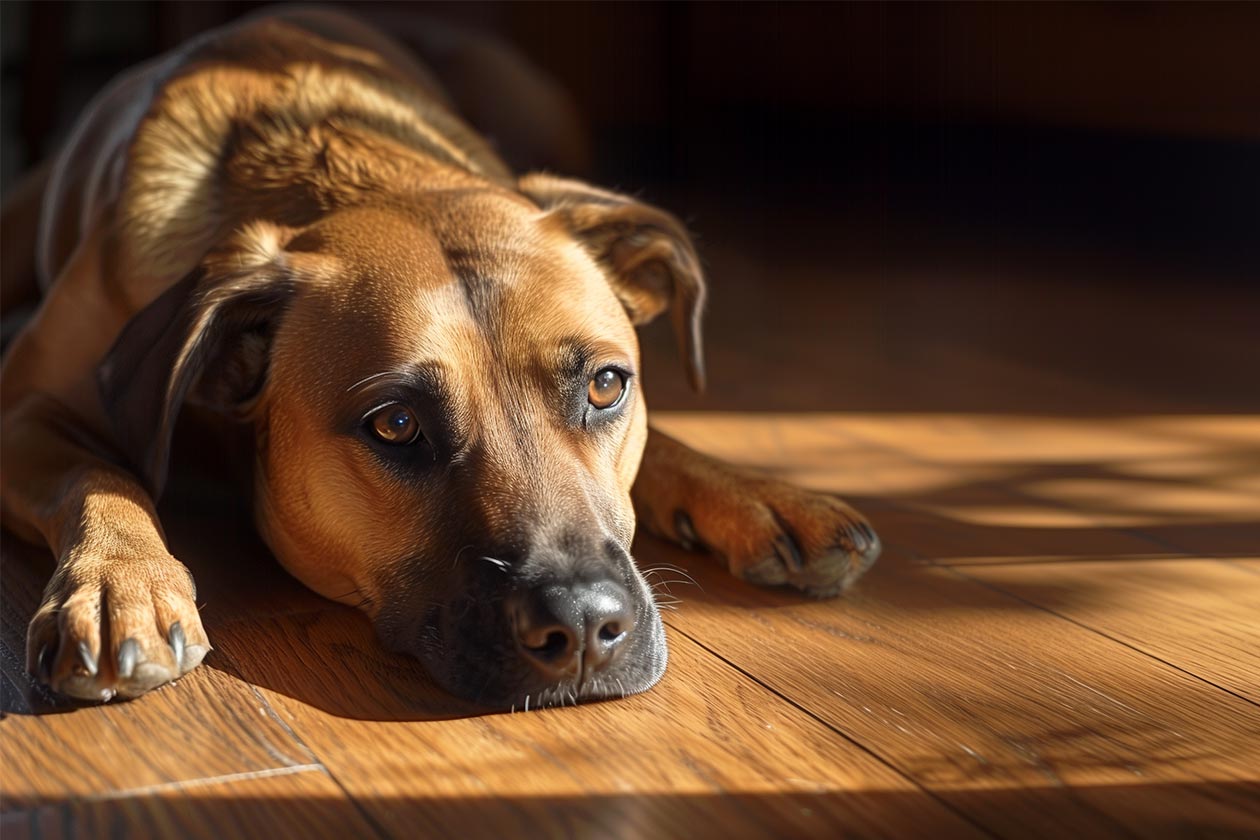
22 Jul 2024 • 10 min read
Many people know what it is like to lose a pet, but what about a pet that loses their human companion? Pets experience loss and grief, along with all the confusion and distress that comes with new routines and changes in their lives. By blending scientific insights and examples of what a pet may go through when losing their human, we show the importance of understanding that pet struggle with loss just as we do. Animals can have profound connections with humans, and it is worth considering our perceptions of animal emotions and cognition to encourage a deeper appreciation for the animals in our lives.
Susan Fraser
Founder
A Day in the Life of Max
Every day, Max enjoyed the sunlight that filtered through the curtains and created a warm spot on the hardwood floor. He relaxed in that spot each morning while he listened to the hum of the refrigerator and the ticking of the clock. Right on schedule the coffee pot began to gurgle, set off by its automatic timer. Max's soft black nose twitched, inhaling the familiar smell. His tail thumped gently against the boards. He knew his human would be out of bed soon.
The door at the end of the hall would creak gently, and he would hear the quiet scuffing of slippers as his companion of the last 10 years, Jerry, made his way to the kitchen. Jerry would put food in Max's bowl, pour a cup of coffee, and the two would share the kitchen while they enjoyed their breakfast. Then, Jerry would get dressed and ready to leave the house and Max would dance circles in the living room while he waited, knowing it was time for their first walk of the day.
Each day was a predictable pattern of joy and comfort, and it had been that way ever since Max could remember. He was a tiny puppy when Jerry rescued him from a dumpster, and he didn't know a life outside of this one. There were walks and snacks and adventures, with fetch in the yard and naps in the afternoons. Evenings brought a peaceful routine of dinner, followed by quiet moments as Max lay next to his human on the couch, content in the warmth of their companionship and a soft blanket.
The Day Everything Changed


One Tuesday, it all went wrong. The sunlight made its slow way across the floorboards. The coffee pot started its gurgle and the scent of brewing beans wafted through the house. But there was no noise from the door at the end of the hall. Max's ears perked at every sound, waiting for the familiar creak of the bedroom door. It didn’t come.
Minutes stretched into hours. Max was hungry and confused. He went to his human's door and whined. When that didn't help he scratched gently at the door, and then paced the house, nails clicking on the floor, in a restless search for his missing human. That evening, when his panic continued to rise and he knew that something was terribly wrong Max sat in the middle of the living room, barking and howling until he was hoarse.
Eventually, strangers came into the house with a stretcher and carried Max's human out on it, covered in a white sheet. Another stranger approached Max, talking to him softly, and clipped an unfamiliar leash to his collar. Max didn't want to go with the stranger, but what choice did he have? His human was gone, and his whole world was turned upside down.
Science and the Grieving Process
Grief is not a uniquely human emotion. Studies on grief in animals show that many animals grieve the loss of pack members, children or parents, or the humans they have become close to. BBC Earth, for example, has a fascinating article on the depth and breadth of animal grief. There are valuable lessons that can be gained from grieving, and from understanding the importance of life and the finality of death. Many people believe that this level of understanding only belongs to humans, but research into the area shows that this is very likely not the case.
Additionally, the James L. Voss Veterinary Teaching Hospital at Colorado State University addresses the multiple ways that animals grieve, including changes to their eating, sleeping, and bonding habits. Grief is not identical in animals and humans, but it can be strikingly similar. Comforting a grieving animal is also similar to comforting a grieving human, with the understanding that grief after loss is not uniquely black and white, and can look different from day to day.
Processing an Emotional Journey
For Max, losing his human meant the beginning of an emotional journey where he would learn to process a life without the only companion he had ever known. Days turned into a confusing blur as Max sat, head down, in a cage at a shelter full of other animals, and all the noise and chaos that came with it. He huddled in the corner, no longer wagging his tail or looking for sunbeams on the floor. There was no smell of coffee, no scuff of slippered feet.
After two weeks in a cage, the door swung open and a soft voice called to him. He didn't bother to look, but the voice persisted. Finally, Max raised his head to see a smiling young woman at the door of his cage. She was holding a familiar blanket, the one that had been on the couch where he cuddled with his lost human. Slowly, Max's nose picked up the hint of a scent he recognized and he made his way toward it, inhaling deeply on the soft cloth. Jerry's niece, his only surviving relative, had driven across the country to rescue him. She kept the blanket close to his nose for comfort, as she clipped a leash to his collar and led him to her car.
Finding a Connection after Loss
Now the blanket lays on a new couch, at a new house, in a new part of the country. The scent of his missing human has mostly faded from it, but Max lies on it every night. The girl who rescued him is called Beth, and her touch is different. Her scent is unfamiliar. But she offers kindness and love, and the kind of kibble Max likes best.
Max’s heart is still heavy with grief but it has begun to open. He is accepting his new routines, though they can never replace the old ones. Beth doesn't drink the same brand of coffee as Jerry did, and she doesn't wear slippers. Some days are better than others. On good days, Max chases a ball in the yard, his tail wagging with a hint of its former enthusiasm. On bad days he lies by the door, staring at the handle and waiting for a reunion that will never come. Max is coming out of his grief, slowly, and there are more good days than bad days, but Jerry will always be in his mind, and Beth cannot replace him.


A Reflection on the Human-Animal Bond
Max's journey through loss shows us the profound depth of the human-animal bond. His emotions are raw and genuine, and mirror the grief of a human losing a loved one. Max didn’t just miss his human's presence. He grieved the loss of companionship, the disruption of their shared routines, and the comfort of a familiar touch.
A pet's capacity for love and loyalty runs deep, and many animals have rich and complex emotional worlds. In the silence of their suffering, they teach us valuable lessons about the resilience of the heart and the enduring power of love. Max’s story is a testament to the bond between humans and their pets, and how that bond transcends words to touch the very core of our shared existence.
Personalized Memorials for Cherished Pets
While it can be traumatic and difficult for a pet to lose their human companion, the same is true for humans who lose their pets. That's why personalized pet memorials are so important to help bring comfort and closure to a difficult time. Custom-printed cremation urns can give grieving pet owners the opportunity to create a unique and meaningful tribute to their lost companions.
With advanced direct printing technology you can have high-quality, detailed designs or photographs applied directly to urns to increase their level of personalization. This process can be an important part of the healing experience, allowing you to celebrate your pet's individuality and the special bond the two of you shared. There are a number of options for pet memorials available on InTheLightUrns.com. If you're facing or anticipating pet loss, we can help you memorialize your pet in a way that honors them and acknowledges their importance in your life.
Key Takeaway:
Pets can form deep bonds with their human companions and experience profound grief during and after the experience of loss. Many animals experience behavioral changes during grief, as well as altered routines and physical symptoms. Recognizing grief in animals helps deepen our appreciation of the bond we share with them, to provide bereaved pets more care.









